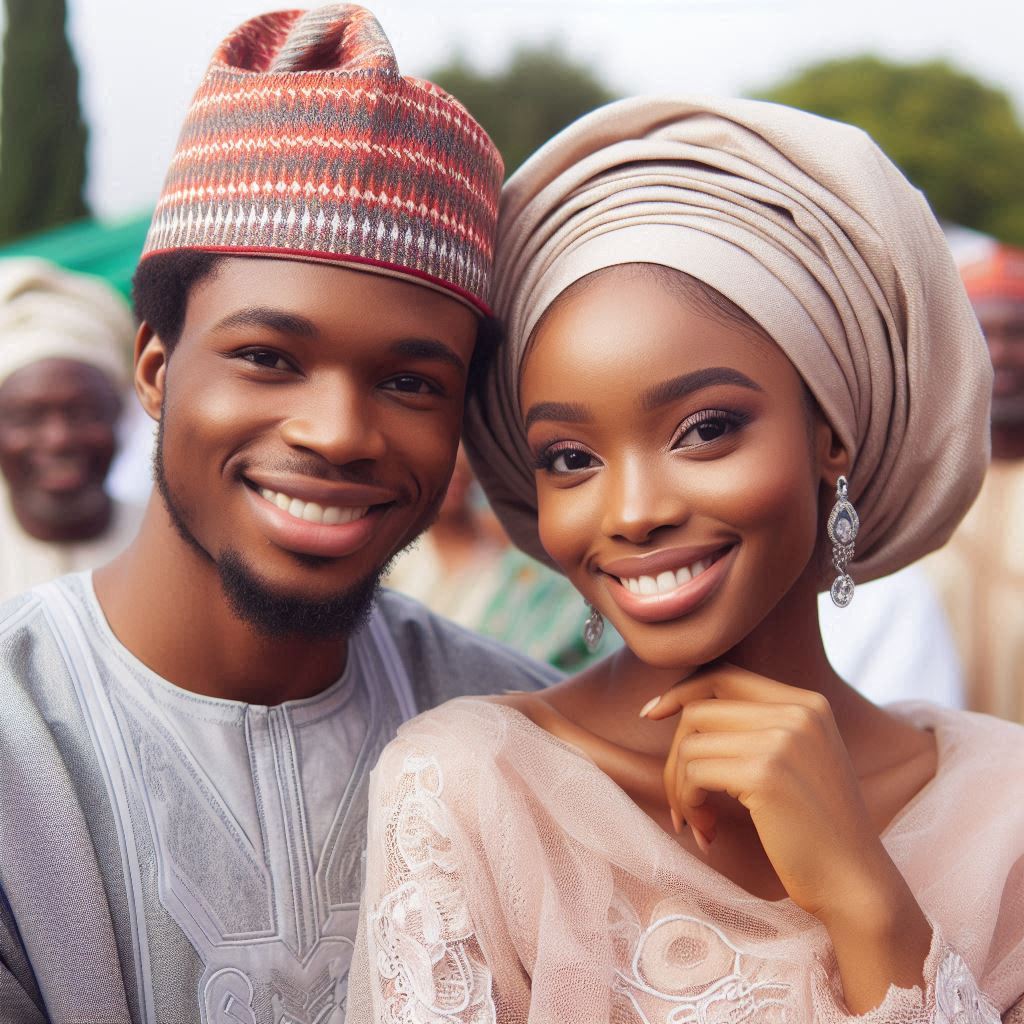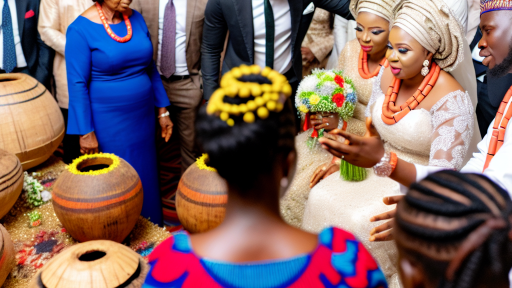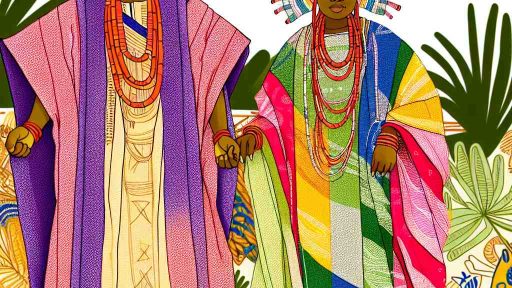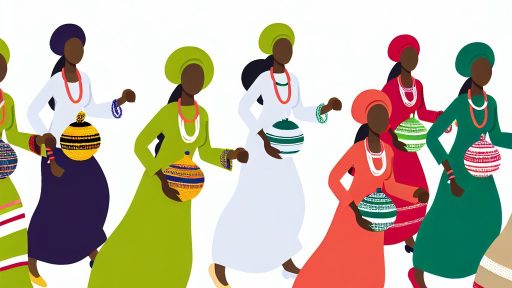Introduction
Marriage in Nigerian culture encompasses diverse traditions and practices, illustrating how culture influences gender roles in marriage.
Each ethnic group brings unique customs to the marital process.
Families play a vital role, emphasizing communal values and expectations.
The union celebrates not only love but also family partnerships and societal bonds.
Overview of Marriage in Nigerian Culture
In Nigeria, marriage stands as a significant life milestone.
Traditional ceremonies often blend religious and cultural elements.
Families conduct elaborate rituals and celebrations, reflecting deep-rooted customs.
Marriage serves to unite families and strengthen community ties, creating a strong social fabric.
Importance of Understanding Gender Roles
Understanding gender roles in marriage is crucial in Nigeria.
Gender expectations deeply influence marital dynamics.
Men typically assume the role of providers, while women often manage domestic responsibilities.
This division affects various aspects, including decision-making and family planning.
Nigerian culture often prioritizes male dominance, impacting women’s socio-economic opportunities.
However, these roles vary by region, with urban areas displaying more egalitarian views.
Understanding these nuances helps to appreciate the rich tapestry of Nigerian marriages.
Purpose of the Blog Post
This blog post aims to explore how Nigerian culture shapes gender roles in marriage.
By examining cultural influences, we can highlight the evolving nature of these roles.
It is essential to recognize the balance between tradition and contemporary societal changes.
We will delve into specific examples, showcasing how gender roles manifest in different ethnic groups.
This exploration will provide insights into the complex interplay of culture, gender, and marriage in Nigeria.
Ultimately, this understanding can foster greater appreciation and respect for the diverse experiences within Nigerian marriages.
Historical Context of Marriage in Nigeria
Overview of traditional marriage practices
Traditional marriage in Nigeria encapsulates a rich tapestry of customs and rituals.
Each ethnic group has distinct practices that reflect its belief systems and values.
Some key features of traditional Nigerian marriage practices include:
- Payment of Bride Price: Families often negotiate a bride price, which demonstrates the groom’s commitment.
This price varies among different cultures. - Introduction Ceremony: The families formally meet to discuss the marriage proposal.
It signifies the union of not just two individuals but also two families. - Traditional Attire: Brides and grooms often wear culturally significant attire.
This showcases their heritage and the importance of their backgrounds. - Role of Elders: Elders play a significant role in officiating the ceremony and providing blessings.
Their presence symbolizes the community’s endorsement of the union. - Festivities and Feasts: Marriage ceremonies often include vibrant celebrations with music, dance, and food.
These festivities strengthen communal bonds and reflect joy.
The traditional marriage process reflects societal values and unforeseen expectations surrounding gender roles.
Men typically take charge of financial responsibilities for the ceremonies.
Women often focus on family and beauty, reinforcing specific roles within marriage.
Evolution of marriages over time
The concept of marriage in Nigeria has evolved significantly.
Various factors have contributed to this transformation.
Key points include:
- Modern Influences: Increased exposure to Western ideals has reshaped perspectives on marriage.
Young Nigerians now prioritize love over arranged marriages. - Education and Empowerment: Women are now more educated and economically independent.
This shift allows them to redefine their roles within marriages. - Urbanization: As more people move to cities, traditional practices sometimes diminish.
Urban centers reflect diverse lifestyles that influence marital practices. - Legal Reforms: Changes in laws concerning marriage have emerged.
Modern regulations support gender equality and challenge patriarchal norms. - Technological Advances: Social media and the internet expose Nigerians to global ideas about love and relationships.
This influence shifts traditional views on marriage.
These changes in marriage dynamics reflect broader societal transformations.
Many young people now prefer partnerships built on mutual respect and shared goals.
However, traditional expectations still play a role in shaping behaviors and beliefs within marriages.
Influence of colonialism on gender roles
Colonialism significantly impacted gender roles in Nigeria.
The colonial era introduced Western ideologies that reshaped societal norms.
Several aspects highlight this influence:
- Legal Systems: Colonial governance established legal frameworks that often favored patriarchal structures.
These systems enforced male dominance in marital arrangements. - Education Disparities: Missionary schools educated boys more than girls.
This limited women’s opportunities and reinforced gender inequalities in marriage. - Religious Influence: Missionaries promoted specific religious beliefs that often diminished traditional practices.
Many customs were marginalized, leading to shifts in gender roles. - Labor Market Changes: Colonialism changed economic structures, pushing men to urban areas for work.
Women often remained in rural areas, taking on additional household responsibilities. - Political Suppression: Colonizers oppressed traditional leaders who supported women’s rights.
This suppression stunted the growth of equitable gender roles in society.
Understanding this colonial legacy is crucial in analyzing present-day gender roles in marriage.
Despite progress, remnants of colonial influence still exist.
Many Nigerians grapple with balancing traditional expectations with modern beliefs about partnership and equality.
In conclusion, the historical context of marriage in Nigeria is both complex and multi-faceted.
Traditional practices reflect deep historical roots, while evolving influences continue to shape contemporary marital dynamics.
Colonial history remains a significant factor in understanding current gender roles.
It is essential to navigate these influences as individuals seek to define their marriages in modern Nigeria.
The Role of Religion in Shaping Gender Expectations
Overview of Major Religions in Nigeria
Nigeria is a diverse country with various religious beliefs.
The major religions include:
- Islam: Predominantly practiced in the northern regions.
Followers are called Muslims. - Christianity: Mainly found in the southern and central parts.
Followers are called Christians. - Traditional Beliefs: Indigenous spiritual practices that vary among ethnic groups.
These beliefs coexist with other religions.
This religious plurality significantly influences societal values and norms.
Each religion contributes uniquely to shaping gender roles, especially in marriage.
How Religious Teachings Influence Gender Roles
Religion plays a crucial role in defining gender expectations for men and women.
Each faith presents specific teachings that guide relationships.
With these teachings come distinct roles in marriage:
- Islam: Men are viewed as providers and protectors.
Women are often seen as caregivers and homemakers. - Christianity: Emphasizes partnership, but traditional views often depict women as submissive.
Men are typically seen as heads of the household. - Traditional Beliefs: Gender roles can differ significantly based on local customs.
Men often hold decision-making power within families.
These teachings dictate behaviors and responsibilities in marriages.
They reinforce expectations and cultural stereotypes.
Often, the pressure to conform can be overwhelming.
Case Studies of Religious Practices and Their Impact on Marriage
Various religious practices illustrate how gender roles manifest in marriage.
Here are case studies that highlight these dynamics:
Islamic Marriage Practices
In Islamic marriages, the concept of mahr is essential.
This is a mandatory gift from the groom to the bride.
It symbolizes respect and responsibility.
- Men are expected to provide financial support.
- Women are encouraged to focus on family and domestic responsibilities.
- Polygamy is accepted, which can impact women’s roles significantly.
These practices can lead to unequal power dynamics in marriage.
Women may feel pressured to conform to these expectations.
Consequently, their autonomy can be restricted.
Christian Marriage Practices
Christian teachings emphasize love and partnership in marriage.
However, traditional views often persist in Nigerian society.
- Men are commonly viewed as leaders of the family.
- Women are often expected to submit to their husbands.
- Church teachings can reinforce traditional gender roles.
Many couples face challenges balancing modernization with these traditional ideals.
Women may struggle for their voices to be heard in marital decisions.
This conflict can lead to resentment and discontent.
Traditional Beliefs and Gender Roles
Traditional beliefs significantly differ among Nigerian ethnic groups.
Each group has unique customs that affect marriage dynamics.
- In many cultures, bride price is a crucial custom, reinforcing male authority.
- Men often make major decisions, while women handle domestic duties.
- Certain rituals dictate expected behaviors based on gender.
While some traditions empower women, many limit their opportunities.
Women’s roles can be confined to specific spheres.
They may have little say in important matters.
The intersection of Religion and Modernity
As Nigeria becomes more globalized, the intersection of religion and modernity complicates gender roles.
- Cultural influences from Western societies have led to changing perspectives on gender.
- Many women seek higher education and professional careers.
- Religious institutions sometimes struggle to adapt their teachings to modern views.
This clash often creates tension within families.
Men may resist changing gender roles, fearing loss of authority.
Women, on the other hand, push for equality and empowerment.
Women’s Empowerment within Religious Frameworks
Despite the challenges, many women find strength within their religious frameworks.
They navigate their identities through faith:
- Participating in community religious activities provides support.
- Religious teachings can inspire women to assert their rights.
- Women-led initiatives can arise within religious communities, promoting empowerment.
Many religious women challenge traditional norms while still honoring their faith.
This duality allows them to create space for themselves.
They seek equality while maintaining their cultural identities.
The Role of Men in Redefining Gender Roles
Men also have significant roles in reshaping gender expectations.
Many men recognize the benefits of equitable partnerships:
- Sharing household responsibilities creates stronger bonds.
- Encouraging women’s ambitions benefits families and communities.
- Pursuing a more inclusive understanding of masculinity can promote gender equality.
Men who embrace these changes can lead by example.
They help challenge outdated stereotypes and promote healthier relationships.
Their support plays a crucial role in redefining gender dynamics in Nigerian marriages.
Religion profoundly influences gender roles in Nigerian marriages.
While it can reinforce traditional expectations, it is also evolving.
Both men and women navigate these complexities.
Changing dynamics create opportunities for dialogue and growth.
Embracing these changes can lead to healthier, more equitable marriages.
Read: The Role of Culture in Shaping Modern Nigerian Marriages
Cultural Traditions and Gender Roles
Importance of Cultural Norms and Customs
Nigerian culture is rich with traditions and customs.
These elements profoundly influence gender roles in marriage.
Cultural norms shape expectations within families.
They dictate how individuals conduct themselves in various social roles.
In Nigeria, marriages often reflect deep-rooted societal beliefs.
Cultural expectations include roles in the household.
Many people follow longstanding traditions that define their responsibilities.
Adhering to these norms creates a sense of belonging.
However, they can also reinforce restrictive gender roles.
Furthermore, customs often determine the dynamics of marital relationships.
In many Nigerian families, the husband is viewed as the head.
His role is predominantly that of the provider.
Conversely, the wife traditionally assumes the role of the caretaker and homemaker.
Many customs are also tied to religious beliefs.
Different religions adopt varying practices in relation to marriage roles.
For instance, religious teachings can encourage male dominance or emphasize partnership.
Such beliefs ultimately shape the foundation of many marriages.
Traditional Gender Expectations in Marriage (Provider vs. Homemaker)
The archetypal view of gender roles significantly influences Nigerian marriages.
The man is primarily seen as the provider.
He is expected to offer financial support for the family’s needs.
This involves providing food, shelter, and education for the children.
On the other hand, women are often seen as homemakers.
Their responsibilities include managing the household and caring for children.
This division creates a defined family structure.
Such clear delineation of responsibilities can foster stability.
However, adhering to these traditional roles can lead to challenges.
Many women in Nigeria seek to advance their careers.
They desire independence and want to contribute financially.
This desire often clashes with traditional expectations.
Consequently, the shift in roles sometimes causes tension within marriages.
Couples might struggle to balance career aspirations and familial obligations.
Ultimately, expectations can lead to conflicting priorities and distress.
Variations in Gender Roles Based on Tribe or Ethnicity
Nigeria is a tapestry of diverse cultures and ethnic groups.
These groups possess unique traditions that influence gender roles.
Consequently, the expectations placed on men and women vary significantly across different tribes.
- Yoruba: In Yoruba culture, women often hold significant roles.
They may manage family businesses while also fulfilling household duties. - Igbo: Igbo culture emphasizes male roles as community providers.
The men often focus on their careers, leaving women in charge of the home. - Hausa: Hausa culture traditionally views men as dominant figures.
Women’s roles are centered around maintaining the household.
These variations highlight how cultural practices shape expectations.
In some tribes, women attain more agency and respect.
In others, they may find their roles severely restricted.
Moreover, younger generations often challenge traditional norms.
Urbanization and education expose them to different views.
This new awareness often ignites conversations about gender roles in marriage.
Changes are evident in the way couples negotiate their roles.
They increasingly share responsibilities and decisions.
Such shifts signal a growing demand for equality in relationships.
Ultimately, the impact of culture on gender roles remains complex.
Each tribe contributes its own nuances and expectations.
Understanding these differences enriches our comprehension of Nigerian marriages.
As we continue to explore these themes, it is essential to recognize both growth and resistance.
Cultural traditions deeply influence individual lives.
Consequently, they hold the power to shape not only homes but also entire communities.
Read: How Nigerian Marriage Traditions Reflect Family Values and Heritage

The Impact of Education on Gender Roles
Changing Educational Opportunities for Men and Women
Education plays a crucial role in shaping gender roles within Nigerian marriages.
Historically, men dominated educational fields.
Women often faced barriers to education due to cultural expectations.
However, recent decades have seen a significant shift.
Increased access to education for women is evident.
This change results from advocacy, government policies, and international support.
Key factors that have influenced educational opportunities include:
- Government policies: The Nigerian government has implemented initiatives that focus on gender equality in education.
- NGO involvement: Non-governmental organizations have worked to provide scholarships and resources for girls.
- Community awareness: Communities increasingly recognize the importance of educating both boys and girls.
- Access to technology: Digital platforms provide remote learning opportunities, breaking geographical barriers.
With the increasing number of educated women, their roles in society and marriage have evolved.
Women now pursue higher education at unprecedented rates.
This new reality reshapes traditional views on marriage and family life.
The Connection Between Education and Shifting Gender Dynamics in Marriage
Education significantly impacts power dynamics within marriages.
Educated women typically have higher self-esteem and confidence.
They often challenge traditional gender roles enforced by cultural standards.
Thus, education empowers them to negotiate shared responsibilities within marriage.
This shift leads to several important changes in gender dynamics:
- Financial independence: Educated women are more likely to have careers, which contributes to financial security.
- Mutual decision-making: Educated couples often make joint decisions rather than adhering to patriarchal norms.
- Shared parenting roles: Education encourages both parents to participate actively in child-rearing.
- Delayed marriage: Higher education often leads to women prioritizing careers before starting families.
As women become financially independent, traditional power dynamics in marriages shift.
Men often share household responsibilities, promoting equality.
Couples now work as partners rather than conforming to outdated gender roles.
Illustrative Examples of How Education Has Changed Marriage Decisions
Numerous examples highlight education’s impact on marriage decisions in Nigeria.
Education empowers individuals to embrace opportunities and challenge traditional norms.
Aisha, a business administration graduate and project manager, chose her partner based on mutual respect.
Her financial independence and shared responsibilities illustrate how education transforms marriage dynamics.
Emeka, an engineer, married Ngozi, a medical doctor.
Their marriage reflects collaboration, as both contribute equally, sharing career and household roles.
In rural areas, education remains a challenge, yet changes occur.
A scholarship initiative helps break the cycle of early marriage.
Girls benefiting from this program often become teachers or health workers, gaining respect and positively influencing their communities.
These stories reveal a changing landscape where education enhances marital satisfaction.
Educated couples report better communication and emotional support.
The impact of education also extends beyond individual marriages.
Educated women influence their communities by advocating for education and gender equality, pushing for policies that support women’s rights.
More Nigerian families recognize the importance of education for daughters, often prioritizing it over traditional expectations.
In conclusion, education profoundly impacts marriage and gender roles.
These examples show how educational opportunities reshape personal choices and cultural narratives.
As access to education grows, marriage dynamics and societal norms will continue to evolve, fostering a more progressive outlook on gender roles.
Read: Deep Dive into Nigerian Marriage Cultural Practices
Economic Factors and Gender Roles in Marriage
Overview of Economic Status in Nigeria
Nigeria’s economy is diverse, driven by agriculture, oil, and services.
Over 40% of Nigerians live below the poverty line, creating a challenging environment.
Economic disparities are pronounced; urban areas are often more prosperous than rural regions.
Many families rely on both partners for income to maintain their households.
This economic necessity influences the division of labor and roles in marriages across Nigeria.
Gender Roles Related to Economic Contributions
Traditional gender roles often shape expectations around contributions in Nigerian households.
Men typically serve as the primary breadwinners, expected to provide financial support.
Women are often expected to manage the home and care for children.
However, economic realities challenge these traditional roles.
Many women contribute significantly to household income through various means.
- Employment in formal sectors like education or healthcare.
- Informal work, such as street vending or farming.
- Entrepreneurship, including small businesses and crafts.
These contributions empower women and shift perceptions about gender roles.
As women earn income, they gain more family decision-making power.
This empowerment sometimes leads to conflicts between traditional expectations and new dynamics.
How Financial Independence Affects Marriage Dynamics
Financial independence significantly alters marriage dynamics in Nigeria.
It empowers women, granting them agency in both domestic and public spheres.
Many couples now share financial responsibilities, fostering partnership.
This shift contributes to more egalitarian relationships, allowing greater communication.
However, challenges remain within traditional mindsets.
Some men may feel threatened by their wives’ financial success.
Conversely, women sometimes experience pressure to conform to traditional roles despite earnings.
Therefore, it’s crucial to address both partners’ needs and aspirations.
Financial independence can lead to better relationships if navigated thoughtfully.
The Impact of Education on Economic Contributions
Education is a pivotal factor determining economic contributions in marriages.
Higher education levels often correlate with better job opportunities for both genders.
As more women pursue higher education, they become more competitive in the labor market.
This trend supports their financial independence and ability to contribute economically.
Consequently, educated women challenge traditional roles, advocating for equality.
Moreover, educated women often communicate their needs effectively within marriages.
The Role of Cultural Beliefs in Economic Dynamics
Cultural beliefs heavily influence economic roles within marriages.
Cultural expectations define what it means to be a husband or wife.
In many traditions, men are taught to view financial success as a measure of masculinity.
Meanwhile, women may feel societal pressure to prioritize family over career.
These cultural narratives can create tension in marriages when expectations diverge.
Couples must negotiate their roles openly to foster understanding.
The Influence of Social Class
Social class significantly impacts economic contributions and gender roles in marriage.
In affluent families, expectations may skew towards equal partnership.
However, in lower-income families, traditional roles often persist due to economic necessity.
Economic pressures can dictate who works outside the home and who manages domestic tasks.
Couples in wealthier social classes may have more freedom to define their roles.
However, they also face unique pressures to maintain a certain lifestyle.
The Future of Marriage Dynamics
As Nigeria’s economic landscape evolves, marriage dynamics will continue to shift.
More women will enter the workforce, impacting traditional roles.
Financial independence will likely further empower women in marriages.
Increased access to education will change societal expectations around gender roles.
Future marriages may reflect more diverse arrangements and egalitarian principles.
Reshaping these dynamics will require open dialogue and adaptation from both partners.
Ultimately, addressing economic factors will remain essential in understanding gender roles in Nigerian marriages.
Read: How Nigerian Marriages Shape Family Dynamics in 2024
Modern Influences and Changing Gender Narratives
The Role of Globalization and Media in Shaping Perceptions
Globalization has profoundly altered how cultures engage with traditional values.
It promotes interconnectedness and exposure to diverse lifestyles.
This expansion of viewpoints influences gender roles within marriage considerably.
Media plays a critical role in disseminating new ideas.
Through television, social media, and films, we often witness portrayals of modern couples.
These depictions challenge traditional gender roles and encourage new narratives.
Here are several ways media shapes perceptions:
- Creating awareness about gender equality and women’s rights.
- Highlighting successful professional women balancing family and work.
- Showcasing men who embrace fatherhood and domestic responsibilities.
- Encouraging discussions on gender expectations and responsibilities.
Furthermore, globalization introduces concepts like emotional intelligence in relationships.
Couples now understand the importance of empathy and communication in their marriages.
The rise of relationship experts and psychologists in the media promotes this knowledge.
People increasingly embrace the idea of shared responsibilities in the home.
As a result of these influences, many Nigerian couples now negotiate their roles within the family frame.
They engage in dialogues about expectations.
This shift allows for a more balanced partnership, contrasting traditional, rigid structures.
Emergence of Feminist Movements and Their Impact on Marriage
Feminist movements in Nigeria have gained momentum in recent years.
They advocate for women’s rights, gender equality, and empowerment.
This movement’s growth significantly influences perceptions of marriage.
Feminism challenges traditional gender norms that confine women to domestic roles.
It encourages women to pursue education and career opportunities.
Within marriages, this leads to more equitable partnerships focused on mutual respect.
Some key impacts of feminist movements include:
- Advocacy for women’s education and career opportunities.
- Promotion of shared decision-making in marital relationships.
- Encouragement for women to assert their financial independence.
- Demand for the recognition of domestic labor as valuable.
Modern couples increasingly view marriage as a partnership.
This balance challenges the historical view of marriage as primarily a woman’s domain.
Couples now recognize that both partners contribute to their family’s well-being.
Additionally, these movements increase awareness about domestic violence and its consequences.
Women are more willing to speak out against abusive relationships.
They seek support systems within communities and advocate for legal protections.
Consider the case of a Nigerian woman pursuing a degree.
She balances her studies, a job, and family responsibilities.
This achievement showcases how feminist principles reshape gender dynamics within marriages.
Women are no longer just caregivers; they become breadwinners and leaders.
Case Studies on Modern Nigerian Couples Who Defy Traditional Roles
Many modern Nigerian couples challenge traditional gender roles, demonstrating evolving norms in marriage.
They redefine success through collaboration and shared responsibility.
Below are a few compelling case studies.
- Amaka and Tunde: This couple exemplifies a partnership that thrives on collaboration.
Amaka runs a successful handmade jewelry business.
Tunde supports her endeavors while also managing household responsibilities.
Their relationship flourishes due to mutual respect and understanding. - Chinonso and Ify: Both partners pursue advanced degrees in engineering.
They prioritize education equally, sharing domestic chores and childcare responsibilities.
Their marriage exhibits their commitment to both personal and professional growth. - Daniel and Aisha: Daniel is a stay-at-home dad while Aisha leads a corporate team.
This arrangement was initially met with skepticism from their families.
Nevertheless, they have reshaped their family dynamics and demonstrated that nurturing can transcend gender expectations. - Jide and Ewa: Both Jide and Ewa are passionate about social issues.
They co-founded an NGO focused on women’s empowerment.
Their partnership reflects a shared commitment to social change while maintaining support for each other’s careers.
These couples illustrate a shift away from conventional dynamics.
They show that flexibility and negotiation create a healthy relationship foundation.
In this new era, couples form alliances built on equality and partnership.
As more Nigerian couples adopt these models, society’s views on marriage continue to evolve.
Traditional expectations face scrutiny, and individuals are empowered to define their roles.
This change brings hope for future generations seeking more equitable relationships.
In conclusion, globalization, feminist movements, and modern case studies illustrate the evolving nature of gender roles in marriage.
Couples today prioritize collaboration, equality, and respect.
Through these changes, new narratives emerge, paving the way for future relationships.
This evolution does not diminish traditional values; instead, it enhances them, fostering a culture of mutual understanding and support.
Challenges and Conversations Surrounding Gender Roles in Nigerian Marriages
Persistent Challenges and Disparities in Gender Expectations
Nigerian culture places strong emphasis on traditional gender roles.
These roles often create specific expectations within marriages.
Men are typically viewed as breadwinners and decision-makers.
Women, conversely, often bear the responsibility of homemaking and child-rearing.
This division can create persistent challenges for couples.
- Education and Employment Disparities: Many women face barriers in education and employment.
Traditional beliefs prioritize the education of males.
As a result, women may have fewer opportunities for professional growth. - Economic Dependency: Some women might depend on their husbands for financial support.
This dependency can limit their agency and decision-making power. - Representation in Leadership: Women are often underrepresented in leadership positions.
This lack of representation extends to many sectors, including politics and business. - Societal Pressure: Women frequently face societal pressure to conform to domestic roles.
This pressure can lead to feelings of inadequacy for those pursuing careers.
These challenges lead to disparities in relationships.
Women may feel constrained by society’s expectations while men grapple with pressure to provide.
Ultimately, this imbalance can cause frustration and resentment in marriages.
Societal Conversations on Gender Equality
In recent years, discussions around gender equality have gained momentum in Nigeria.
Activists and organizations advocate for women’s rights and gender equality.
These conversations challenge the traditional views surrounding marriage and family life.
- Advocacy Campaigns: Various NGOs promote awareness of gender equality.
They work tirelessly to educate communities on the importance of shared responsibilities. - Changing Perspectives: Younger generations increasingly view gender roles as outdated.
Many young couples strive for equitable partnerships, sharing responsibilities equally. - Media Representation: Media plays a crucial role in shaping perceptions.
Positive representations of women in leadership and business challenge stereotypes. - Community Initiatives: Local programs engage communities in discussions about gender roles.
These initiatives encourage open dialogue between men and women regarding expectations and responsibilities.
As these conversations continue, they serve as a catalyst for change.
Empowering women and promoting gender equality can transform traditional marriages.
Men can also benefit from embracing equality, as shared responsibilities foster stronger partnerships.
Future Outlook on Gender Roles within Nigerian Marriages
The future of gender roles in Nigerian marriages appears promising.
Societal shifts indicate a move towards greater equality.
Younger generations advocate for shared responsibilities and mutual respect.
- Education for All: Increased focus on education for girls will transform future generations.
Educated women can contribute more effectively to family and society. - Economic Empowerment: Financial independence will allow women to make choices.
This shift can lead to more balanced marital dynamics. - Legal Reforms: Advocating for legal protections can safeguard women’s rights.
These reforms can empower women within their marriages. - Supportive Partnerships: Couples are increasingly viewing partnerships as equal.
They strive to collaborate rather than conform to traditional roles.
Societal shifts will continue to challenge outdated norms.
The push for gender equality will shape how marriages operate in Nigeria.
Continued conversations about gender roles is essential for progress.
Overall, a more equitable future will benefit both men and women.
As changes unfold, marriages can evolve into partnerships built on mutual respect and understanding.
Conclusion
Nigerian culture significantly shapes gender roles in marriage.
Traditionally, men assume the role of breadwinners, while women focus on homemaking.
This division often results in distinct expectations from both genders.
However, contemporary shifts challenge these norms.
Educated women now pursue careers, seeking equal partnerships.
Men also increasingly engage in domestic responsibilities.
Cultural practices continue to influence these dynamics, blending tradition with modernity.
The evolution of gender roles in Nigerian marriages reflects broader societal changes.
As more women enter the workforce, the traditional breadwinner model evolves.
Both partners are beginning to share financial and domestic duties.
The younger generation increasingly values partnership over rigid gender roles.
Despite cultural pressures, couples strive for equality.
This shift enhances mutual respect and collaboration within marriages.
Additionally, ongoing dialogue about gender roles leads to greater awareness and understanding.
Understanding the influence of culture on gender roles in marriage remains vital.
I encourage readers to explore this topic further.
Engaging in discussions within communities can foster awareness and change.
Researching varying perspectives enhances our comprehension of these evolving dynamics.
Blogs, forums, and educational platforms can provide valuable insights.
Join the conversation about gender roles in Nigerian marriages.
Share stories and experiences to create a more inclusive narrative.
Together, we can contribute to this important discourse.




